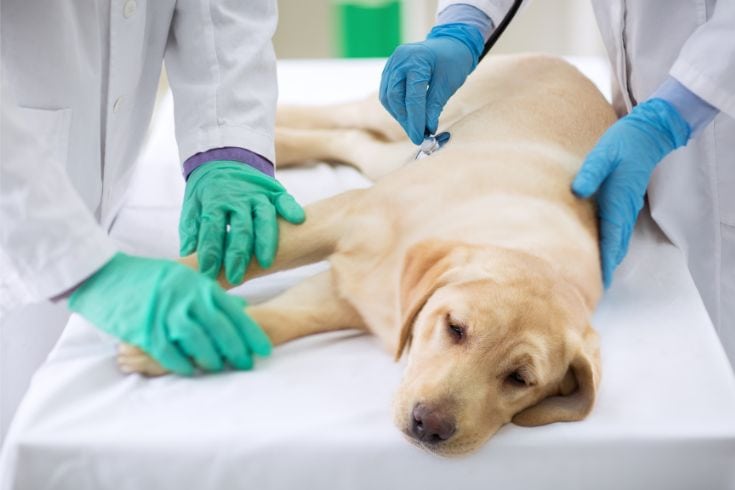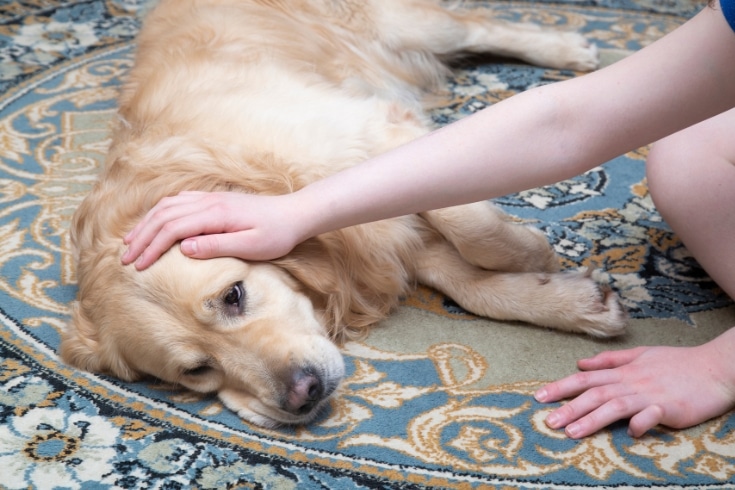“I read that repeated exposure to lawn chemicals can cause cancer in dogs. My dog walked on the grass with pesticide; should I be concerned?”
Some pesticides and insecticides are highly toxic and can make your dog sick, even causing certain types of cancer. Dogs can ingest pesticides by licking their paws after walking on grass that’s recently been sprayed or by inhaling pesticides while walking past a field where a crop sprayer is operating.
Read this guide to learn more about the dangers posed by lawn pesticides and what to do if your dog has been exposed to them.
What Is Pesticide Poisoning?

Pesticide poisoning happens when a dog ingests or inhales a chemical that you’ve used on your lawn.
Pesticides and insecticides are designed to kill, prevent, repel, or destroy insect pests that can damage your garden lawn. There are 20 insecticide classes recognized by the EPA, with almost 400 chemical compounds and over 1,700 products commercially available.
Two of the top four US insecticide active ingredients are organophosphates (malathion and acephate). According to the CDC, organophosphates are the most widely used pesticides and are, therefore, the most likely that your dog could be exposed to. That said, the degree of organophosphate toxicity varies.
How Are Dogs Exposed To Lawn Pesticides?
Your dog can be exposed to lawn pesticides in several ways:
- Walking on the lawn right after it was treated and then licking their feet
- Eating weeds or grass close to recently applied pesticide
- Eating dead or dying bugs that have been sprayed with pesticide
- Ingesting the product directly from the container, including spray, gel, bait, liquid, and dust
Always store chemicals, such as car cleaning products, antifreeze, garden insecticides, fertilizers, and the like, well out of your pets’ reach in a secure cupboard.
How Much Lawn Pesticide Does It Take To Poison A Dog?

The toxicity of each pesticide varies, depending on its active ingredients or chemicals, as well as on how much your dog ingested.
For that reason, there is no general rule of thumb, so we recommend consulting your vet immediately if you think your dog has ingested poison.
What Are The Symptoms Of Pesticide Poisoning?
The symptoms of pesticide poisoning in dogs usually appear within minutes of exposure, although that’s not always the case.
I remember one time, I had walked my dog Bruce to the stable yard where I kept my horse. Bruce happily ran around the fields while I rode, mucked out, etc., and then we walked the two miles home again through the fields and bridle paths.
All was well until an hour or so after we arrived home when my dog began behaving strangely, tottering unsteadily on his feet and drinking bowl after bowl of water. I rang my vet immediately, and Bruce was admitted to the vet clinic as an emergency, where he was placed under observation.
Luckily, the effects of whatever my dog had ingested eventually wore off without treatment. The vet thought that a barbiturate-based rabbit poison might have been to blame, basically causing my furry friend to experience a massive “high!” Other than a slight hangover, my pet was fine the following day, and all was well.
Pesticide Poisoning Symptoms
The clinical signs of pesticide poisoning vary, depending on the product’s active ingredient, but common symptoms include:
- Drooling excessively
- Redness of mucous membranes and eyes
- Skin irritation
- Diarrhea
- Vomiting
- Abdominal pain
- Weakness, collapse, incoordination
- Uncontrollable defecating or urinating
- Breathing difficulties
- Muscle tremors or spasms
- Seizures
If your dog displays any of these symptoms, and you think he might have been exposed to lawn pesticide, contact your vet as an emergency.
Emergency Action!

It’s helpful for your vet if you can tell them how much of the product and what kind of pesticide your dog has ingested.
That information is crucial for our vet since toxicity varies tremendously between pesticides, ranging from relatively mild to life-threatening. Ideally, save the product packaging if you have it or try to find the label online so that you can check what ingredients the pesticide contains.
If the label is illegible, call the Poison Control hotline at 1-800-222-1222 and ask for help or check out their website.
How Is Dog Pesticide Poisoning Treated?
Your furry friend’s veterinary treatment will depend on what he ate and what symptoms he displays.
If the ingestion occurred within the last hour, the vet might recommend inducing vomiting under controlled conditions in the veterinary clinic as a means of decontamination. If the dog is already showing clinical signs of poisoning, it’s probably too late to induce vomiting because of the danger of aspiration pneumonia.
In that case, your vet might give your dog activated charcoal to bind any residual toxin, enabling the poison to pass through the dog’s gastrointestinal tract without absorption. Your dog might also be bathed to remove any residual pesticide from his feet or skin.
In very severe cases, your dog could be hospitalized and placed on an IV drip to rehydrate him, and he might undergo additional treatments to relieve seizures and muscle tremors. It’s likely a full blood count, urinalysis, and serum blood chemistry panel will be required to provide a baseline evaluation.
What’s The Prognosis Of Lawn Pesticide Poisoning in Dogs?
If lawn pesticide poisoning in dogs is to be treated successfully, early diagnosis and aggressive treatment are critical.
Your canine companion has the best chance if you can identify the toxin quickly and get your pet to the vet immediately. Pesticide poisoning can be deadly, but with prompt treatment, the prognosis is usually pretty good.
Dogs typically recover fully from pesticide poisoning and suffer no lasting side effects, even in severe cases and after a few days of hospitalization.
Prevention

Prevention is definitely far better than cure when it comes to pesticide poisoning in dogs!
Dogs are curious creatures, and many will happily eat an insect sprayed with pesticide. If dead insects litter your lawn after you’ve treated it, take the time to clean them up and dispose of them out of reach of your dog.
Keep all lawn care products, including fertilizers, locked away from Fido’s reach, and don’t allow your dog anywhere near areas treated with pesticide or insecticide until the area is completely dry.
If possible, use only natural lawn care products that are safe for pets rather than chemicals.
When Is It Safe For My Dog To Go Back On The Lawn?
Before allowing your dog to go back onto the lawn after you’ve applied pesticide, it’s safest to allow 24 to 72 hours, depending on the product and the weather.
Generally, you can let your dog out again once the lawn is completely dry. However, we strongly recommend consulting the pesticide product manufacturer for guidance.
FAQs
Here, we answer a few of your questions about the dangers of lawn pesticides.
Q: Is Roundup poisonous to dogs?
A: Some studies quoted in Scientific American have linked lawn pesticides, including Roundup, to an increased risk of some forms of canine cancer. Therefore, we can say that Roundup is harmful to dogs.
Q: Is dog pesticide poisoning life-threatening?
A: Yes, pesticide poisoning is life-threatening for your dog. However, if the poisoning is detected and treated quickly, the prognosis is very good.
Q: How can I get sticky grass seed off my dog’s coat?
A: The easiest way to remove sticky grass seed from your dog’s fur is to comb him thoroughly with a wide-toothed metal comb. Use a detangler product to help the comb pass through the coat more easily and without snagging.
Q: If my dog eats pesticide, should I make him vomit?
A: Do not induce vomiting if your dog ingests pesticide. Instead, contact your vet immediately for advice and guidance.
Final Thoughts
Did you enjoy our article about the dangers of lawn pesticides? If you found the article helpful, please share it!
Many commonly used lawn pesticides contain chemicals that can harm your dog. If you think your dog has ingested pesticide by licking his paws, through his skin, or via inhalation, contact your vet immediately for advice.
If possible, try to retain the pesticide’s packaging or check the label online to find out the brand name. That information will be invaluable to your vet.
Do you have a non-toxic, pet-safe alternative to lawn pesticides? Tell us in the comments box below!
